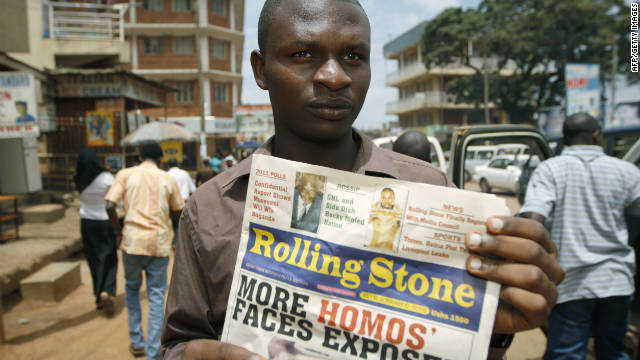By Zach Waksman
Impunity Watch Reporter, Africa
ABUJA, Nigeria – Gay rights in Nigeria took a step backwards on Tuesday. In the face of the United Kingdom’s threat to cut off aid to Africa’s most populous country, its Senate unanimously passed a bill that, if approved by the House of Representatives and signed by President Goodluck Jonathan, would make same-sex relationships illegal. The action has been met with widespread approval among the general population.

The bill would have several significant effects on homosexuals. If passed, which is expected, anyone who enters into a same-sex relationship or civil union would face a 14-year term in jail upon conviction. Those convicted of “witness[ing], abet[ting] and aid[ing]” the performance of a same-sex marriage and “support[ing] the registration [of same]” would serve 10 years behind bars, as would anybody who registered or operated a gay nightclub or organization. It would also invalidate any certificates of marriage for same-sex relationships issued outside of Nigeria. Section 3 of the bill provides that “only marriage contracted between a man and a woman either under Islamic law, customary law or the marriage Act is [recognized] as valid in Nigeria.”
Last month, British Prime Minister David Cameron warned that his country would consider withholding aid to countries that discriminated against homosexuals. In justifying the bill, Senate President David Mark considered it a way of protecting his country’s values.
“If there is any country that does not want to give us aid or assistance just because we want to hold on to our values, that country can keep her aid and assistance,” he said, in what may have been a reference to the threat. “No country has the right to interfere in the way we make our own laws because we don’t interfere in the way others make their own laws.”
Nigeria had been debating this bill for the past month. This morning, after the bill’s passage, The Sun Newspaper’s headline proudly declared “”Homosexuals are in trouble!” But according to Chude Jideonwo, a Nigerian journalist, the country is already strongly homophobic. To many, the belief is that “homosexuality is ‘of the devil,’ against our ‘culture’ and an encroachment of ‘sad Western values.’” Even before passage, he said that there was not much demand, “even a quiet one,” for gay marriage of any form. This raises the question of why the issue was raised in the first place.
“I can’t recall a particular place where this type of marriage has taken place in Nigeria,” said Adetokunbo Mumuni, director of the Socio-Economic Rights and Accountability Project. “This particular thing they have assented to is a thing of no substance to Nigeria. They should focus on things that affect the majority of Nigerians.”
In international circles, the bill has not received much praise. Andrew Lloyd, the U.K.’s High Commissioner to Nigeria, reiterated the possibility of sanctions, but added that the media may have overblown Cameron’s remarks. On Wednesday, he spoke to journalists in Dutse to better explain the British position, which he believed would be matched by most of the Western world.
“It is wrong to punish people for mere expression of their relationships or for choosing to become what they have chosen for themselves,” Lloyd said. “Punishment is infringement upon their fundamental human rights and the western countries would not condone the action.”
Amnesty International, a human rights group, condemned the legislation and called for the House to halt the bill’s passage. It is concerned with the potentially massive effect the law would have on human rights for a wide variety of people besides the newly-criminalized homosexual population.
“This bill would have a chilling effect on a range of civil society organizations and events while inciting hatred and violence against anyone suspected of practicing same-sex relationships, including lesbian, gay, bisexual, and transgender people,” said Erwin van der Borght, director of the organization’s Africa Programme. “By aiming to single out and deprive the rights of one group of people, this bill threatens all Nigerians by violating the country’s Constitution and international human rights obligations.”
According to one of its supporters, an alleged effect of the bill would be an improvement in Nigeria’s overall health.
“Same sex marriage has negative effect on the health of anyone that involved in it,” said Senator Nkechi Nwogu. “It was unanimous decision by the Senate to pass the bill into law. It is very unfortunate that the western countries want to force their culture on us.”
With similar legislation being discussed or otherwise proposed elsewhere on the continent, this might be the right time for the continent start a dialogue on the topic, which is normally a social taboo. Many African countries depend heavily on foreign aid to remain afloat. To some, this situation presents an opportunity to deal with the issue directly, instead of trying to suppress it.
“Now is the time to talk about it … to get our house in order. Let’s use this opportunity to say, ‘OK, if we didn’t have aid, how would we survive?’” said Nigel Mugamu of Zimbabwe. “Let’s talk about gay rights issues. Let’s turn this into a national – African discussion.”
For more information, please see:
CNN — Anti-Gay Law: ‘Why I’m Ashamed to Be Nigerian’ — 01 December 2011
CNN — Nigerian Senate Passes Anti-Gay Bill, Defying British Aid Threat — 01 December 2011
Daily Trust — Britain Won’t Accept Anti-Gay Law, Says Envoy — 01 December 2011
Nigerian Tribune — Senate Recommends 14-Year Jail Term for Same Sex Marriage — 30 November 2011
This Day — Senate Criminalises Same-Sex Marriage — 30 November 2011
Amnesty International — Nigeria Urged to Halt Bill Banning Same-Sex Relationships — 29 November 2011
People’s Daily — Senate Outlaws Same-Sex Marriage — 29 November 2011
Vanguard — Senate Bans Same-Sex Marriage — 29 November 2011

